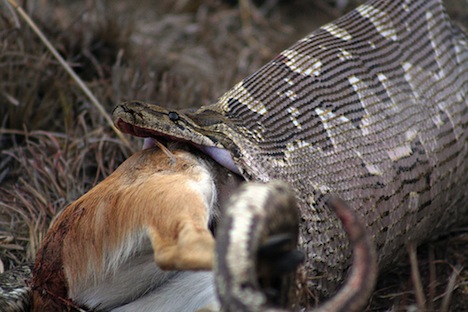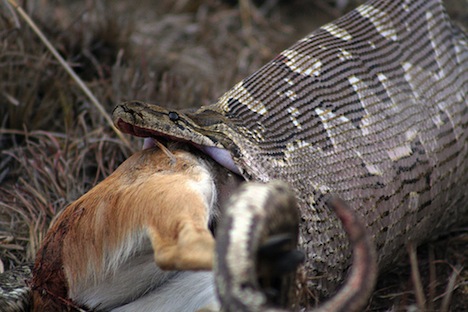
The Obama administration wants to strangle job growth in America like some kind of giant, prosperity-choking python, mostly by banning the importation of said pythons, says a new GOP report.
In a new report entitled "Broken Government: How the Administrative State has Broken President Obama's Promise of Regulatory Reform," GOP members cited the proposed snake ban as one of seven examples of red tape choking off job growth in an already ailing economy.
After all, the snake-importation industry bears the U.S. economy on its shoulders. As go snake importers, so goes the country, right? Everyone knows that.
Here's the irony: on the same day the GOP objections to restrictions on snake transport came to light, along comes a reminder of why it's probably not a good idea to allow the pet trade to ship invasives willy-nilly all over the country:
There are now more invasive species of reptiles and amphibians in the state of Florida alone than any other place on earth. The grand total: 137 different invasive species, including the Burmese Pythons that the GOP would like to see scattered to the four corners of the lower 48.
By definition, invasives are animals "whose introduction causes or is likely to cause economic or environmental harm or harm to human health."
But the GOP had no less than a snake breeder touting their cause at the hearing! Which is funny, because breeders and the pet trade are exactly how the overwhelming majority of those snakes, lizards and amphibians ended up in Florida in the first place. Oh yes, it’s not just pythons. There’s also been an invasion of monitor lizards in suburban West Florida, not to mention a potential gigantic, killer, hybrid "super-snake" loose in the Everglades.
“It’s like some mad scientist has thrown these species together from all around the world and said, ‘hey let’s put them all together and see what happens,’ ” [herpetologist Kenneth] Krysko says. “It could take decades before we actually know the long-term effects these species will have.”



